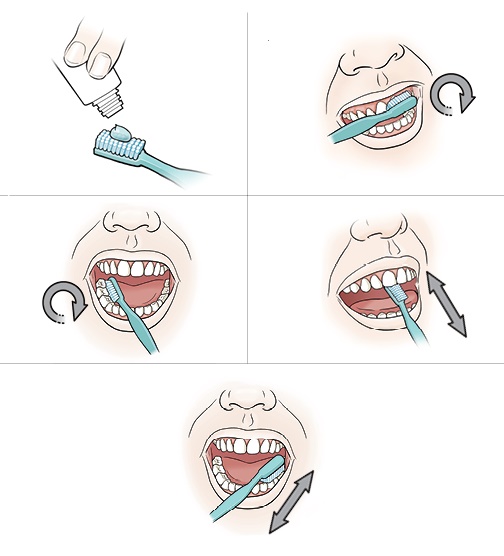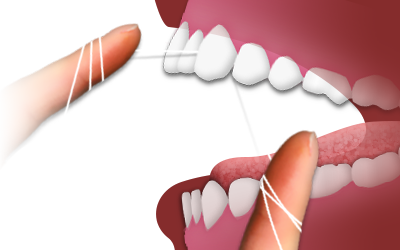One of the ways that we at Brownsburg Dental Professionals, PC promote healthy smiles for all of our patients in and around Indianapolis is through our preventative dentistry treatments. These preventative and general treatment methods, such as cleanings, exams, and sealants will help make sure that your teeth are as healthy as possible. While visiting your dentists is always a great option, the absolute best way to keep your mouth in excellent condition is through preventative oral care. This includes regularly brushing and flossing, two techniques which we'll be glad to teach you more about.
Brushing
The foundation of a healthy mouth includes a great brushing regimen. For a proper and effective brushing technique, we recommend doing the following:

-
You should start by picking out a soft-bristled toothbrush and placing a small strip of fluoride toothpaste onto it.
-
Hold your toothbrush at a 45-degree angle and point it at your gum line.
-
Use small, gentle, circular motions to reach food particles that may be trapped underneath your gum line.
-
Continue this method for the outsides of all of your teeth; make sure to brush down on your upper teeth and brush up on your lower teeth.
-
Perform this on the insides of your teeth as well.
-
After you're done, use a back-and-forth brushing motion to clean the chewing surfaces of your teeth.
-
Finally, brush your tongue and the roof of your mouth to help ensure a fresh and clean mouth.
How Often Should You Brush?
While many patients are acclimated to brushing twice a day, we suggest four times so that you can avoid the accumulation of food particles in your mouth. You should brush:
-
After breakfast
-
After lunch or after school
-
After dinner
-
Before bed
Keep in mind that you should never brush hard or apply a lot of pressure while brushing—this can damage your gums and enamel.
How Long Should Brushing Last?
Brushing should last about two minutes - one minute for your upper teeth and another for your lower teeth. This should give you enough time to properly brush. By not brushing for long enough, you may not be getting rid of all of the bacteria on your teeth. This can lead to serious problems, such as gum disease.
When Should I Get a New Toothbrush?
We recommend changing your toothbrush about once every three to four months. However, if the bristles on your brush start to fray,or if you have been ill, it's best to change it sooner. The reason for this is because fraying bristles aren't as good at removing plaque and bacteria from a person's mouth and when your ill bacteria from your illness can linger on your tooth brush.
Flossing

Dental floss is vital for removing plaque and food particles from areas between the teeth and below the gum line that your toothbrush can't quite reach. To properly floss your teeth, you'll want to:
-
Break off about 18 in of floss and wrap most of it around one of your middle fingers. Wind the rest around your middle finger on the opposite hand leaving about one inch of floss between your fingers.
-
Keeping the floss taut slip it between your teeth using your thumb and forefinger to guide the floss between your teeth. Never snap the floss down on the gums. Curve the floss in a C-shape around the sides of your teeth
-
Slide the floss gently under the gums until you meet resistance and work it up and down several times between gum and biting surfaces of both sides of the teeth.
-
Continue this process until you've flossed between all of your teeth, and on the back surfaces of the last molar. Move fresh section of floss into place between fingers as necessary.
What If My Gums Are Bleeding?
Although a lot of people have issues with bleeding gums, it is not something that should be ignored. Bleeding Gums are most often a sign of gum disease and/or poor oral hygiene, but can also point to a number of other health problems as well.
Occasional bleeding of the gums can be the result of brushing your teeth too vigorously or wearing dentures that don't fit correctly. Frequent episodes of gum bleeding, however, can indicate more serious conditions, such as:
-
periodontitis
-
poor oral hygiene
-
vitamin deficiency
-
lack of clotting cells (platelets)
Dental Conditions That Can Cause Bleeding Gums
Dental care issues are the primary cause of bleeding gums. Gingivitis (inflammation of the gums) and periodontitis make your gums sensitive and more prone to bleeding.
Gingivitis
Most people develop gingivitis when plaque remains on the gum line for too long. Plaque refers to the debris and bacteria that stick to your teeth. Brushing your teeth removes plaque and can prevent you from developing cavities, also known as dental caries. Plaque may stay on your gum line, however, if you don't brush and floss properly. The accumulation of plaque near your gums can cause gingivitis.
Symptoms of gingivitis include:
-
puffy gums
-
soreness in the mouth and around the gums
-
bleeding gums
Periodontitis
Periodontal disease, or periodontitis, can occur when gingivitis continues to an advanced stage. Periodontal disease is the infection of the gums, jawbone, and supportive tissues that connect your teeth and gums. Periodontitis can cause your teeth to loosen or fall out.
Vitamin Deficiencies
Deficiencies of vitamins C and K can also cause gums to bleed easily. However, vitamin deficiencies aren't often seen in people who live in developed countries, according to the Linus Pauling Institute. This is because healthy children and adults living in developed areas of the world have access to vitamins C and K through food and supplements.
If you're concerned about this being an issue, ask us about it at your next appointment and we can better help you determine if this could be an issue for you and it you might need to visit your physician to discuss it further. Also, Follow a diet that contains both of these nutrients to ensure that you're getting the vitamins you need to stay healthy.
Other Causes of Bleeding Gums
People who wear dentures also may experience bleeding of the gums from time to time. This is more likely when the dentures are too small or fit too tightly. You can always speak with us if dentures or other oral appliances are causing your gums to bleed. You may need to take new impressions to create a better-fitting mouthpiece.Pregnancy is a common cause of gum bleeding in women. The hormonal changes that occur during pregnancy can cause the gums to become more sensitive.
Bleeding disorders, such as hemophilia and leukemia, can also increase your chance of bleeding gums. Your gums might bleed more often if you take blood-thinning medications. Drugs in this class include warfarin, aspirin, and heparin.
Treatment of Bleeding Gums
Good dental hygiene is the first step to managing bleeding gums. Visit us twice yearly for a professional cleaning. During your cleanings we will let you know if you have gingivitis and teach you how to brush your teeth properly. Proper brushing and flossing can eliminate plaque from your gum line, reducing your risk of developing periodontal disease.We may also recommend you to use an antiseptic mouthwash to minimize the plaque that forms in your mouth.
Other ways to reduce discomfort and/ or stop bleeding gums include:
-
Rinse of warm salt water can help soothe swollen gums that bleed easily
-
Use a soft toothbrush that is gentle on inflamed gums, especially if you experience bleeding after brushing your teeth. Medium and hard bristles may be too abrasive for your delicate gums.
-
Consider using an electric toothbrush. The specially designed brush heads on these toothbrushes can help you to clean your gum line more easily than a manual toothbrush.
Additionally, schedule an appointment with your primary care provider to determine if dental health is not the underlying issue causing your bleeding gums. A complete physical examination and blood work can help determine the cause of your bleeding. Treatment will vary according to your condition.
Please let one of our staff members know at your next appointment if this is an issue you have and we can help determine what might be the cause.
Contact Your Indianapolis and Brownsburg, IN Dentists Today!
If you have any further questions about our oral hygiene recommendations or our preventative dentistry treatments, please don't hesitate tocontact us. We offer premier family dentistry in Indianapolis, as well as cosmetic dentistry. If you'd like to schedule an appointment with us, we encourage you to fill out our appointment request form or call us. We hope to hear from you soon and help you attain a healthier smile!
